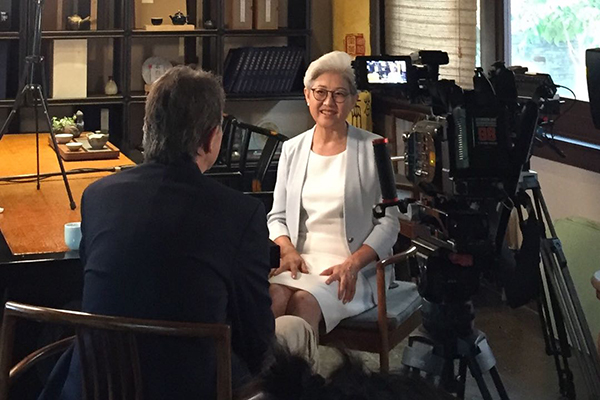 |
|
Wood interviews Fu Ying, China's former vice-foreign minister. [Photo provided to China Daily] |
One of the strengths of the film is the personal testimonies of people like Zhang Weiwei, director of the China Institute at Fudan University and an interpreter for Deng in the 1980s; and Xue Lan, dean of Schwarzman Scholars at Tsinghua University.
"They were the student generation of 1978 (when China's universities opened up again after the 'cultural revolution' from 1966 to '76).
"Xue was working on a farm in a village in central China and thought that would be his life. But when he read in the People's Daily that university exams were going to start again, he was so happy. All these testimonies are fantastically powerful."
Chinese students going abroad also became a phenomenon during that period with 200,000 going to the US in 1978 alone.
Fu Ying, China's former vice-foreign minister and also a former Chinese ambassador to the United Kingdom, who studied international relations at the University of Kent in the UK in the mid-1980s, was among them.
"We had met her when she was ambassador. We were all involved with Shakespeare at Stratford-upon-Avon and we had lunch together," Dobbs says.
"So, when we were setting up to do this (the series) we asked if we could talk to her. She believes it is important for the West and China to know much more about each other."
Wood, 70, who is much taller in real life than he appears on-screen, first became interested in China when he was a pupil at Manchester Grammar School.
"I came across books of Tang poetry and realized there was a whole universe I knew nothing about," he says.
Later, he went on to Oxford to read English and history and then did post-graduate research in Anglo-Saxon history.
"It was then that I shared a house with a German Sinologist, Christoph Harbsmeier, and extraordinary people connected with China used to sit round our kitchen table," he recalls.
Wood initially went into journalism with the BBC but has been a high-profile TV presenter since the 1980s with hugely successful series, including In Search of the Trojan War and In the Footsteps of Alexander the Great.
He was an early pioneer of recounting history by going to locations and also involving local people in the story.
"Most of what went before was like illustrated lectures. But we were kind of hanging out of helicopters and giving it that bit of oomph," he says.
"We have never departed, however, from being anchored in scholarship and I have always been a great believer in texts. So, when we did The Story of China, we wanted to make the audience understand that the history came out of the texts, even though I can't read Chinese."
Dobbs, 67, founder and director of Maya Vision International, the London-based company that made the films, says it is important to bring history alive.
"I'm not a great fan of historians who make it all feel as if it's all coming out of the back of their heads and it is all about them," she says.
"We also use a lot of ordinary Chinese people to tell their stories. I have not seen Chinese history done in this way. Chinese history is often done from a Western perspective with an expert telling the story."
This approach to their work has certainly been popular with Chinese and Western audiences alike.
"With The Story of China, I have never been stopped more on public transport or in the street by total strangers, saying, 'I had no idea that China was like that. Its history is so rich'," says Wood.
Wood, who is also a professor of public history at Manchester University and is now working on a book on the history of China that is scheduled to be published later this year, says he and Dobbs now have a passion about working in China.
"Friends say that you must be glad when you finish filming, but actually we can't wait to get back. We really enjoy filming in China and being with the Chinese," he says.
Contact the writer at andrewmoody@chinadaily.com.cn